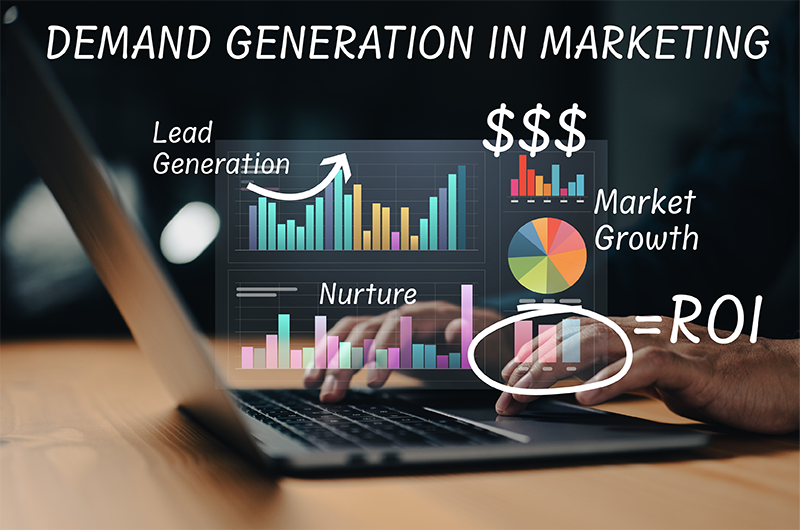Leveraging Demand Generation Strategies to Generate High-Quality Leads
- Diane Dawkins

- Feb 5, 2024
- 4 min read
Updated: Mar 22, 2024
The business landscape is highly competitive so generating high-quality leads is crucial for the success and growth.. Traditional lead generation methods often fall short in delivering the desired results so businesses start to explore alternative strategies. One such approach gaining significant traction is demand generation. By focusing on creating awareness, interest, and demand for their products or services, businesses can attract, and nurture, leads that are more likely to convert into customers. This article explores the concept of demand generation and how it can be effectively utilized to generate quality leads.

Understanding Demand Generation
Demand generation is a holistic marketing approach that aims to create awareness, generate interest, and drive demand for a company's products or services whilst supporting the customer with the right information at the time throughout their buying journey, unlike traditional lead generation. Demand generation focuses on marketing activities which building relationships and nurturing prospects. It involves a combination of various marketing tactics, including content marketing, social media marketing, email marketing, and search engine optimization, to engage and educate potential customers.
Key Components of Demand Generation
1. Content Marketing
Creating valuable and relevant content is essential for demand generation throughout the customer's buying journey. Informative blog posts, whitepapers, e-books, videos, and webinars can position businesses as thought leaders, elevate their brand, and attract potential customers. Tailoring content to address the pain points and challenges of the target audience, and providing valuable insights and solutions, helps guide customers towards their next decision and accelerates the path to purchase. By consistently delivering high-quality content, businesses can build trust, establish credibility, and nurture relationships with their audience. This approach not only drives engagement and loyalty but also increases the likelihood of converting leads into customers. Ultimately, a strategic content marketing strategy can significantly impact the success of a business by influencing customer behaviour and driving revenue growth.
Recommended reading: https://www.linkedin.com/pulse/role-content-marketing-demand-generation-guide-philip-ilic/
2. Social Media Marketing
Social media platforms have become necessary channels for businesses looking to expand their reach and engage with potential customers. Through platforms like Facebook, Twitter, LinkedIn, and Instagram, companies can amplify their demand generation efforts by sharing compelling content, participating in industry discussions, and interacting directly with their target audience.
Recommended reading: https://www.linkedin.com/pulse/leveraging-social-media-e-commerce-counfreedise-retail-solutions/
3. Email Marketing
Email marketing plays a crucial role in demand generation by nurturing leads and guiding your customers through the buyer's journey. By segmenting leads based on their interests and behaviors, businesses can deliver personalized and targeted email campaigns that provide relevant information at the right time to drive engagement.
4. Search Engine Optimization (SEO)
Optimizing website content for search engines is essential for attracting organic traffic and generating leads. By conducting keyword research, optimizing meta tags, and creating high-quality backlinks, businesses can improve their website's visibility in search engine results, increasing the chances of attracting qualified new customers.
Benefits of Demand Generation
1. Higher-Quality Leads
Demand generation focuses on attracting and nurturing leads that have a genuine interest in a company's products or services. By providing valuable content and engaging with potential customers, businesses can identify and prioritize leads that are more likely to convert into paying customers.
2. Improved Conversion Rates By nurturing leads throughout the buyer's journey, demand generation builds trust and credibility with potential customers, enabling higher conversion rates as prospects are more likely to choose a company they trust and have established a relationship with.
3. Increased Brand Awareness
Demand generation increases brand visibility and awareness through the use of such tactics as content marketing and social media marketing. By consistently delivering valuable content and engaging with the target audience directly, businesses can position themselves as industry leaders and gain a competitive edge.
4. Cost-Effective Marketing Demand generation allows a business to focus on building long-term relationships with potential customers, reducing the amount spent on marketing tactics which do not produce the right results, and resulting in a more cost-effective marketing strategy. By nurturing leads and guiding them through the buyer's journey, businesses can reduce the reliance on expensive and none productive marketing and focus on building a loyal customer base.
Conclusion:
Demand generation has emerged as a powerful strategy for generating high-quality leads. By focusing on creating awareness, generating interest, and driving demand, businesses can attract and nurture leads that are more likely to convert into customers. By utilising content marketing, social media marketing, email marketing, and search engine optimization, businesses can effectively engage with potential customers throughout the buyer's journey. Demand generation not only helps businesses generate quality leads but also improves conversion rates, increases brand awareness, and provides a cost-effective marketing approach. As competition continues to intensify, organisations that embrace demand generation strategies will have a significant advantage in generating leads and driving business growth.
Written by: Diane Dawkins

Diane is a seasoned marketing professional with a wealth of experience in marketing communications and digital marketing. With a Master's degree in Marketing Management and over 20 years of industry experience, Diane has worked with Fortune 100 companies and well-known B2B and OEM businesses.




The thoughtful details and expressions make this artwork stand out. Beautiful dog portraits preserve special moments while offering timeless artistic charm.
Selecting the right freight method helps businesses improve supply chain efficiency while staying within budget. One common comparison logistics planners evaluate is ltl vs ftl, especially when shipment volume fluctuates.
Whether you are looking for a hollywood palladium home, business space, or long-term investment, their guidance ensures you make a sound choice.
With cost of removing a mobile home their experience, they can anticipate problems before they arise, helping to avoid delays or unexpected expenses.
Their versatility allows them to pair with circles necklace diverse attire enhancing the overall ensemble for formal events.